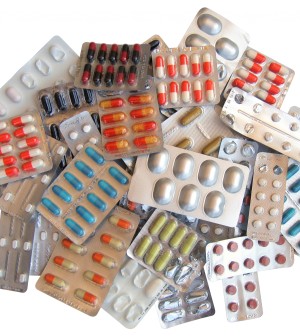- Could Your Grocery Store Meat Be Causing Recurring UTIs?
- Are You Making This Expensive Thermostat Error This Winter?
- Recognizing the Signs of Hypothyroidism
- 10 Strategies to Overcome Insomnia
- Could Artificial Sweeteners Be Aging the Brain Faster?
- Techniques for Soothing Your Nervous System
- Does the Water in Your House Smell Funny? Here’s Why
- Can a Daily Dose of Apple Cider Vinegar Actually Aid Weight Loss?
- 6 Health Beverages That Can Actually Spike Your Blood Sugar
- Treatment Options for Social Anxiety Disorder
Some Home Tattoo Kits Recalled Due to Infection Risk


Inks in some home tattoo kits are contaminated and could cause skin infections, the U.S. Food and Drug Administration says.
The agency issued the warning after tests confirmed bacterial contamination in unopened home tattoo kits marketed by White and Blue Lion, Inc.
“FDA has confirmed one case of skin infection involving a consumer that used this company’s tattoo products, and we are aware of other reports linked to tattoo products with similar packaging,” Dr. Linda Katz, director of the FDA’s Office of Cosmetics and Colors, said in an agency news release.
White and Blue Lion recalled the contaminated products on July 11. However, there are concerns that consumers and professional tattoo artists may be buying or using contaminated home tattoo kits and inks from other distributors, the FDA said.
Consumers should avoid tattoo inks that:
- Have no brand name, carry a dragon logo, and/or don’t have the name and place of business of the maker or distributor
- Are sold singly and in kits that have anywhere from five to 54 or more bottles of inks of various colors
- Are marked with “Lotch” [sic] and batch numbers, and “Date produced” and “Best if used by” dates
“If you’re buying tattoo inks or getting a tattoo from a professional tattoo artist, you should first examine the products to determine whether the inks or kits meet the above descriptions,” Katz said.
She noted that tattooing “poses a risk of infection to anyone, but the risk is particularly high for those with pre-existing heart or circulatory disease, diabetes or compromised immune systems.”
Signs of infection at the site of a tattoo include excessive pain, redness, swelling, weeping wounds, or blemishes. People with any of these signs should seek immediate medical care, Katz advised.
An untreated or inadequately treated local infection could lead to a serious and potentially deadly bloodstream infection called sepsis.
More information
The U.S. National Library of Medicine has more about tattoos.
Source: HealthDay
Copyright © 2026 HealthDay. All rights reserved.










